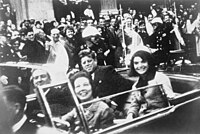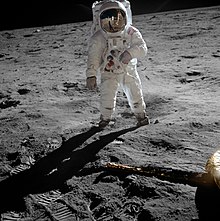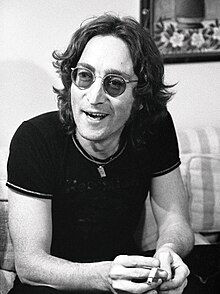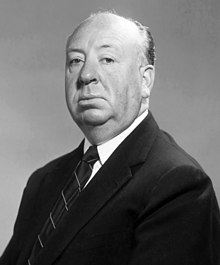Portal:1960s
The 1960s Portal
The 1960s became synonymous with the new, radical, and subversive events and trends of the period. In Africa the 1960s was a period of radical political change as 32 countries gained independence from their European colonial rulers. Some commentators have seen in this era a classical Jungian nightmare cycle, where a rigid culture, unable to contain the demands for greater individual freedom, broke free of the social constraints of the previous age through extreme deviation from the norm. Christopher Booker charts the rise, success, fall/nightmare and explosion in the London scene of the 1960s. However, this alone does not explain the mass nature of the phenomenon. Several nations such as the U.S., France, Germany and Britain turned to the left in the early and mid 1960s. In the United States, John F. Kennedy, a Keynesian and staunch anti-communist, pushed for social reforms. His assassination in 1963 was a stunning shock. Liberal reforms were finally passed under Lyndon B. Johnson including civil rights for African Americans and healthcare for the elderly and the poor. Despite his large-scale Great Society programs, Johnson was increasingly reviled by the New Left at home and abroad. The heavy-handed American role in the Vietnam War outraged student protestors across the globe, as they found peasant rebellion typified by Ho Chi Minh and Che Guevara more appealing. Italy formed its first left-of-center government in March 1962 with a coalition of Christian Democrats, Social Democrats, and moderate Republicans. Socialists joined the ruling block in December 1963. In Britain, the Labour Party gained power in 1964. In Brazil, João Goulart became president after Jânio Quadros resigned. This is a Featured article, which represents some of the best content on English Wikipedia..
Apollo 11 (July 16–24, 1969) was the American spaceflight that first landed humans on the Moon. Commander Neil Armstrong and Lunar Module Pilot Buzz Aldrin landed the Apollo Lunar Module Eagle on July 20, 1969, at 20:17 UTC, and Armstrong became the first person to step onto the Moon's surface six hours and 39 minutes later, on July 21 at 02:56 UTC. Aldrin joined him 19 minutes later, and they spent about two and a quarter hours together exploring the site they had named Tranquility Base upon landing. Armstrong and Aldrin collected 47.5 pounds (21.5 kg) of lunar material to bring back to Earth as pilot Michael Collins flew the Command Module Columbia in lunar orbit, and were on the Moon's surface for 21 hours, 36 minutes before lifting off to rejoin Columbia. Apollo 11 was launched by a Saturn V rocket from Kennedy Space Center on Merritt Island, Florida, on July 16 at 13:32 UTC, and it was the fifth crewed mission of NASA's Apollo program. The Apollo spacecraft had three parts: a command module (CM) with a cabin for the three astronauts, the only part that returned to Earth; a service module (SM), which supported the command module with propulsion, electrical power, oxygen, and water; and a lunar module (LM) that had two stages—a descent stage for landing on the Moon and an ascent stage to place the astronauts back into lunar orbit. (Full article...)This is a Good article, an article that meets a core set of high editorial standards.
Joe 90 is a British science fiction television series created by Gerry and Sylvia Anderson and filmed by their production company, Century 21, for ITC Entertainment. It follows the exploits of nine-year-old schoolboy Joe McClaine, who becomes a spy after his adoptive father invents a device capable of recording expert knowledge and experience and transferring it to another human brain. Armed with the skills of the world's top academic and military minds, Joe is recruited by the World Intelligence Network (WIN) as its "Most Special Agent". First broadcast on the ITV regional franchises between 1968 and 1969, the 30-episode series was the sixth and last of the Andersons' productions to be made primarily using a form of marionette puppetry dubbed "Supermarionation". Their final puppet series, The Secret Service, would include extensive footage of live actors. As in the preceding series, Captain Scarlet and the Mysterons, the puppets of Joe 90 are of natural body proportions as opposed to the caricatured design used for Thunderbirds and earlier Supermarionation productions. (Full article...)Selected picture -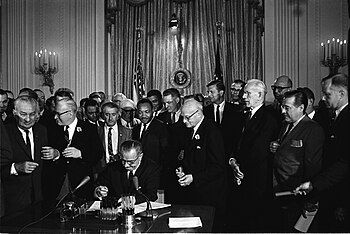 United States President Lyndon B. Johnson (seated) signs the Civil Rights Act of 1964, a landmark piece of legislation that outlawed racial segregation in schools, public places, and employment. Among the guests behind him is Martin Luther King Jr. (directly behind and to the right of Johnson).
Did you know -
Related portalsThis is a Featured article, which represents some of the best content on English Wikipedia..
John Winston Ono Lennon (born John Winston Lennon; 9 October 1940 – 8 December 1980) was an English singer, songwriter and musician. He gained worldwide fame as the founder, co-lead vocalist and rhythm guitarist of the Beatles. His work included music, writing, drawings and film. His songwriting partnership with Paul McCartney remains the most successful in history as the primary songwriters in the Beatles. Born in Liverpool, Lennon became involved in the skiffle craze as a teenager. In 1956, he formed the Quarrymen, which evolved into the Beatles in 1960. Sometimes called "the smart Beatle", Lennon initially was the group's de facto leader, a role he gradually seemed to cede to McCartney. Through his songwriting in the Beatles, he embraced myriad musical influences, initially writing and co-writing rock and pop-oriented hit songs in the band's early years, then later incorporating experimental elements into his compositions in the latter half of the Beatles' career as his songs became known for their increasing innovation. Lennon soon expanded his work into other media by participating in numerous films, including How I Won the War, and authoring In His Own Write and A Spaniard in the Works, both collections of nonsense writings and line drawings. Starting with "All You Need Is Love", his songs were adopted as anthems by the anti-war movement and the larger counterculture of the 1960s. In 1969, he started the Plastic Ono Band with his second wife, multimedia artist Yoko Ono, held the two-week-long anti-war demonstration Bed-ins for Peace and left the Beatles to embark on a solo career. (Full article...)This is a Good article, an article that meets a core set of high editorial standards.
Sir Alfred Joseph Hitchcock KBE (13 August 1899 – 29 April 1980) was an English film director. He is widely regarded as one of the most influential figures in the history of cinema. In a career spanning six decades, he directed over 50 feature films, many of which are still widely watched and studied today. Known as the "Master of Suspense", Hitchcock became as well known as any of his actors thanks to his many interviews, his cameo appearances in most of his films, and his hosting and producing the television anthology Alfred Hitchcock Presents (1955–65). His films garnered 46 Academy Award nominations, including six wins, although he never won the award for Best Director, despite five nominations. Hitchcock initially trained as a technical clerk and copywriter before entering the film industry in 1919 as a title card designer. His directorial debut was the British-German silent film The Pleasure Garden (1925). His first successful film, The Lodger: A Story of the London Fog (1927), helped to shape the thriller genre, and Blackmail (1929) was the first British "talkie". His thrillers The 39 Steps (1935) and The Lady Vanishes (1938) are ranked among the greatest British films of the 20th century. By 1939, he had international recognition and producer David O. Selznick persuaded him to move to Hollywood. A string of successful films followed, including Rebecca (1940), Foreign Correspondent (1940), Suspicion (1941), Shadow of a Doubt (1943) and Notorious (1946). Rebecca won the Academy Award for Best Picture, with Hitchcock nominated as Best Director. He also received Oscar nominations for Lifeboat (1944), Spellbound (1945), Rear Window (1954) and Psycho (1960). (Full article...)Selected article -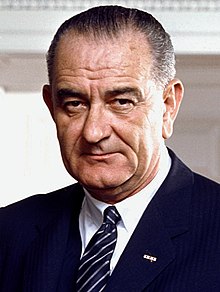 The 1964 United States presidential election was the 45th quadrennial presidential election. It was held on Tuesday, November 3, 1964. Incumbent Democratic President Lyndon B. Johnson defeated Republican Senator Barry Goldwater in a landslide victory. Johnson was the fourth and most recent vice president to succeed the presidency following the death of his predecessor and win a full term in his own right. Johnson won the largest share of the popular vote for the Democratic Party in history, 61.1%, and the highest for any candidate since the advent of widespread popular elections in 1824. Johnson took office on November 22, 1963, following the assassination of John F. Kennedy, and generally continued his predecessor's policies, except with greater emphasis on civil rights. He easily defeated a primary challenge from segregationist Alabama Governor George Wallace to win the nomination. At the 1964 Democratic National Convention, Johnson selected liberal Minnesota Senator Hubert Humphrey as his running mate. In the narrow Republican contest, conservative Arizona Senator Barry Goldwater defeated liberal New York Governor Nelson Rockefeller and Pennsylvania Governor William Scranton. (Full article...)More Did you know (auto generated)
TopicsCategoriesWikiProjects
Associated WikimediaThe following Wikimedia Foundation sister projects provide more on this subject:
Discover Wikipedia using portals |

